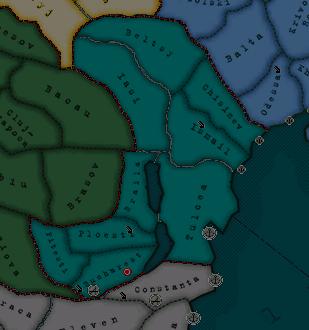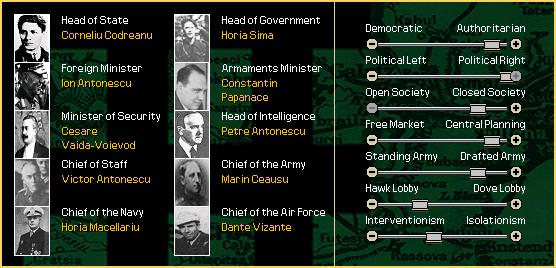Romania
From Kaiserreich
| Line 47: | Line 47: | ||
The treaty was never ratified and by the end of the Weltkrieg, a new treaty consisting of milder terms was drawn. Romania would cede Oltenia to Hungary and the Quadrilateral to Bulgaria. Romania was allowed to keep Bessarabia from the remnants of the Russian Revolution, but the oilfields would be leased to Germany until 2012. The king and government managed to stagger on until 1929, when Corneliu Codreanu led the right wing Iron Guard in a coup d'etat, supported by the army. A military dictatorship, headed by Codreanu, was set up and began to remilitarize Romania. This invalidated the leasing of the oilfields to Germany and thus Romanian industry could benefit once again from cheap oil. | The treaty was never ratified and by the end of the Weltkrieg, a new treaty consisting of milder terms was drawn. Romania would cede Oltenia to Hungary and the Quadrilateral to Bulgaria. Romania was allowed to keep Bessarabia from the remnants of the Russian Revolution, but the oilfields would be leased to Germany until 2012. The king and government managed to stagger on until 1929, when Corneliu Codreanu led the right wing Iron Guard in a coup d'etat, supported by the army. A military dictatorship, headed by Codreanu, was set up and began to remilitarize Romania. This invalidated the leasing of the oilfields to Germany and thus Romanian industry could benefit once again from cheap oil. | ||
| + | |||
| + | [[Category:Countries]] | ||
Revision as of 17:35, 9 October 2007
Romania (Romanian short form: România; long form: Romanian National-Legionary State; Romanian long form: Statul Naţional-Legionar Român) is a country in S-E Europe. It is governed by the Populist Iron Guard movement. It is called Iron Guard Romania in-game.
Contents |
Politics
Cabinet
Head of State: Corneliu Zelea Codreanu
Head of Government: Horia Sima
Foreign Minister: Ion Antonescu
Armaments Minister: Constantin Papanace
Minister of Security: Cesare Vaida-Voievod
Head of Intelligence: Petre Antonescu
Chieff of Staff: Ion Victor Antonescu
Chieff of Army: Marin Ceauşu
Chief of Navy: Horia Măcellariu
Chief of Airforce: Dante Vizante
Party system
One party: The League of the Archangel Michael, also known as the Iron Guard.
Military affiliations
None. Informal affiliation with Greece and Serbia.
History
Following Peace of Paris, concluding the Crimean War (1853 - 1856), the unification of Moldavia and Wallachia was expressly forbidden. However, due to a quirk in the procedure, Ioan Alexandru Cuza was elected Domnitor in both principalities, thus becoming first Prince of the United Principalities (1859 - 1866), to be followed onto the throne by Karl Eitel Friedrich Zephyrinus Ludwig von Hohenzollern-Sigmaringen (1866 - 1914), after a coup staged by the so called "Monstrous Coalition". After the 8th Russian-Turkish War 1877/78, which saw Romania fighting alongside Russia, the country's sovereignty was recognized on the Berlin Congress 1878. Southern Bessarabia was ceded to Russia, while Romania gained Dobrogea.
In 1881 the Romanian Prince took the title of King Carol I. The orientation towards the West was secured, Russian influence lost its appeal. Carol I settled the Second Balkans War (1913) and joined the Quadrilateral with Dobrogea. With the outbreak of World War One in 1914 Romania initially remained neutral, but would join the Entente in 1916, after Carol's successor, Ferdinand ascended to the throne, only to be overrun in a few months by Bulgaria and Austria. In 1918 the government was forced to sign the Treaty of Bucharest, handing over the whole of Wallachia and Dobrogea and areas of the Carpathian peaks, as well as guaranteeing to supply Germany and Austria with oil for the next 90 years.
The treaty was never ratified and by the end of the Weltkrieg, a new treaty consisting of milder terms was drawn. Romania would cede Oltenia to Hungary and the Quadrilateral to Bulgaria. Romania was allowed to keep Bessarabia from the remnants of the Russian Revolution, but the oilfields would be leased to Germany until 2012. The king and government managed to stagger on until 1929, when Corneliu Codreanu led the right wing Iron Guard in a coup d'etat, supported by the army. A military dictatorship, headed by Codreanu, was set up and began to remilitarize Romania. This invalidated the leasing of the oilfields to Germany and thus Romanian industry could benefit once again from cheap oil.



